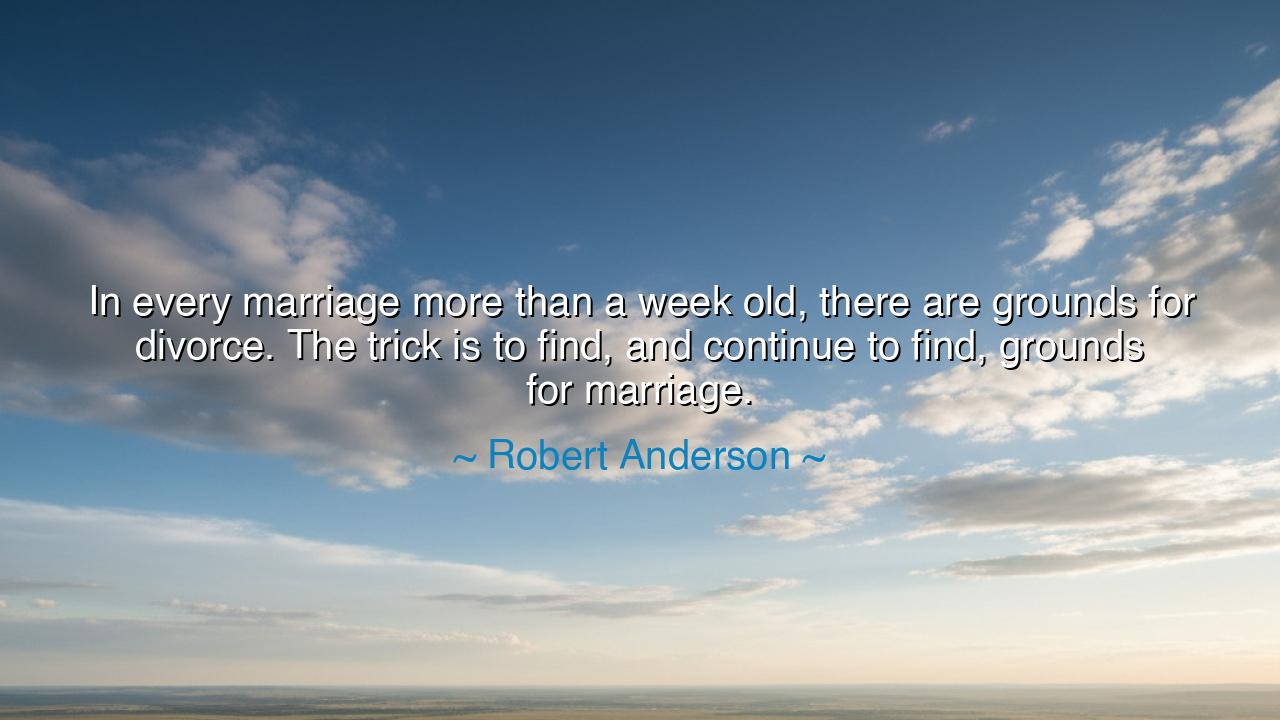
In every marriage more than a week old, there are grounds for
In every marriage more than a week old, there are grounds for divorce. The trick is to find, and continue to find, grounds for marriage.






The words of Robert Anderson — “In every marriage more than a week old, there are grounds for divorce. The trick is to find, and continue to find, grounds for marriage.” — carry both humor and timeless wisdom. They are the words of a man who understood the frailty and resilience of love, who saw marriage not as a static state of bliss but as a living, breathing union of two imperfect souls. Beneath the wit lies a profound truth: that conflict is inevitable, but commitment must be chosen anew each day. Anderson reminds us that the strength of a marriage is not in avoiding trouble, but in continually rediscovering the reasons to remain together despite it.
Robert Anderson, the American playwright and screenwriter, lived through both the triumphs and trials of love, and his words reflect the realism of one who has seen beyond the illusions of romance. He was a writer who studied the human heart — its contradictions, its longings, its capacity for forgiveness. This quote, though born of modern insight, carries the spirit of the ancients, who knew that love, like the seasons, must be renewed through labor and intention. To say that “there are grounds for divorce” in every marriage is to admit that disappointment, misunderstanding, and fatigue are part of the human condition. But the greater wisdom lies in his second line: “The trick is to find, and continue to find, grounds for marriage.” There, in that act of rediscovery, lies the art of enduring love.
In every age, from the palaces of kings to the cottages of the humble, marriage has been both sanctuary and battleground. The ancients understood this duality well. In Greek philosophy, Socrates was said to have told his students, “By all means marry. If you get a good wife, you’ll become happy; if you get a bad one, you’ll become a philosopher.” Beneath the jest lay the same truth Anderson expressed: that to remain in love requires both humor and wisdom. No union is without friction, but it is through that friction that two souls are refined. Just as iron sharpens iron, so too do the challenges of life sharpen the bond between husband and wife — if they choose understanding over resentment, compassion over pride.
Consider the story of Franklin and Eleanor Roosevelt, whose marriage endured betrayal, separation, and political strain. When Franklin’s infidelity threatened to end their union, Eleanor did not retreat into bitterness. Instead, she transformed her pain into purpose, becoming her husband’s ally in service and one of the most respected advocates for human rights in history. Their marriage changed shape — it was no longer the romance of youth, but a partnership of vision. In their story, we see Anderson’s wisdom made flesh: though there were countless reasons to part, they continued to find reasons to stay, to build, to serve together.
Anderson’s insight is not cynical — it is deeply compassionate. He acknowledges that disillusionment comes to all who love. The first glow fades, the world intrudes, and the imperfections of one’s partner become visible. Yet he calls us not to despair, but to diligence. For love is not sustained by feeling but by choice, not by perfection but by perseverance. To find grounds for marriage is to look each day for what is still good, what is still beautiful, what is still worth fighting for. It is to plant seeds of gratitude where once there were only weeds of complaint, and to water them faithfully until they bloom again.
The truth, then, is this: marriage is a continual act of creation. It is not a single vow uttered long ago, but a promise renewed in a thousand small gestures — a patient word, a quiet forgiveness, a shared laughter after sorrow. It is not the absence of conflict, but the triumph of unity over it. As Anderson suggests, anyone can see reasons to quit, but only the wise see reasons to stay. The work of marriage is not to avoid imperfection, but to transform it into understanding; not to escape hardship, but to grow stronger through it.
So, my children, remember this teaching. When you look upon your beloved and see not perfection but struggle, do not think love has failed — it is only now being tested. Seek out the grounds for marriage as one searches for hidden treasure: with patience, with tenderness, with faith. Celebrate what is still noble in one another, and when darkness comes, be the one who lights the candle. For love is not a single flame that burns untouched — it is a fire that must be rekindled, again and again, by the will of those who keep it.
And thus, the wisdom of Robert Anderson endures: that in every marriage, there will always be reasons to walk away — but those who seek, and keep seeking, reasons to remain will discover something far greater than happiness. They will discover love’s truest form — not passion that consumes, but devotion that endures; not perfection, but partnership; not escape from struggle, but the grace to overcome it together.






AAdministratorAdministrator
Welcome, honored guests. Please leave a comment, we will respond soon